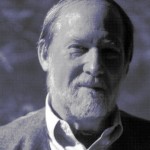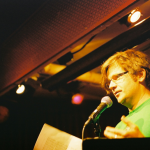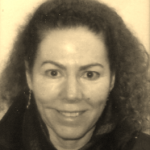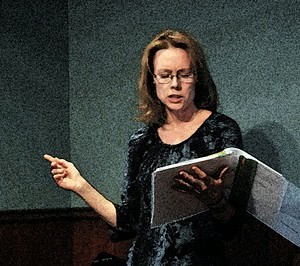Interview with Robert Pinsky
Robert Pinsky is the author of 19 books of poetry and criticism. He is one of America’s best known poets and served as Poet Laureate of the United States from 1997 to 2000. His work The Figured Wheel: New and Collected Poems 1966-1996 won the 1997 Lenore Marshall Poetry Prize and was a Pulitzer Prize nominee. His translation The Inferno of Dante won the Los Angeles Times Book Prize and the Harold Morton Landon Translation Award. He has been honored with an American Academy of Arts and Letters award, the PEN Voelcker prize, the William Carlos Williams Award, and the Ambassador Award of the English Speaking Union. He teaches at Boston University, and he is a poetry editor for Slate Magazine. He also writes the weekly “Poet’s Choice” column for the Washington Post Book World .Mr. Pinsky responded to our questions by email.
EWR: How was your experience guest starring on The Simpsons?
Robert Pinsky: The show is very well written, and performed by superb vocal actors. The literary, cultural and political allusions tend to have engaging backspin. So supplying the voice for my character– a poet with my name and some of my attributes, but a jerk– was a large challenge.
EWR: You have quoted Ezra Pound saying, “The highest form of criticism is actual composition.” What criticisms have you made in your poetry you feel are most important to your work or legacy?
Pinsky: Criticism is based on the Greek krinos,meaning “to choose.” I take Pound to mean that the poet must choose constantly– what word to use, what grammatical construction, how to order the parts, which is the best rhythm?
In contrast, most critics rarely choose, or they choose what they feel is conventionally or academically acceptable, or aligned with the opinions of their pack. The artist does not have that luxury: the artist must choose.
I hope that in my poems I have made useful, heartfelt, original choices regarding rhythm– making new patterns of vowel and consonant, line and sentence– and subject matter, and movement of mind.
EWR: Do you generally have a method or routine you use or follow to create your poetry?
Pinsky: I listen carefully to the consonants and vowels, the patterns of duration and pitch, the various kinds of sentence or sentence fragment, For me, it is like playing with clay, or noodling at a piano, until something interesting happens.
EWR: You are a renowned translator. Does your translation of other poet’s works have an impact generally on your own poetry?
Pinsky: Translation is the highest, most intense form of reading. Reading affects writing, of course– as seeing affects movie-making, or hearing affects music-making.
I have been changed as a writer and as a person by thousands of writers and artists– Euripides, Buster Keaton, Wolfgang Mozart, Sid Caesar, Emikly Dickinson, Charlie Parker, Dexter Gordon, Willa Cather, Francisco Goya, Isaac Babel, Elizabeth Bishop, Akira Kurosawa, Ludwig van Beethoven, Jan de Hooch, the Greene brothers, William Shakespeare, Ben Jonson, Nikolai Gogol, Berenice Abbott, Constantine Cavafy, Walt Kelly . . . and in a similar way, with a special though not unique significance, by Dante Alighieri.
EWR: You studied under Yvor Winters. What influence do you feel his teachings have had on your work? Do you subscribe to the theory that “logical foundations of Western thought” were lost to poets somewhere in the middle of the 18th century?
Pinsky: Winters was a great teacher. He helped me hear, he gave me a model of indifference to cant and a scorn for received ideas. Great gift, he opened for me the poetry of the sixteenth & early seventeenth century, Ralegh and Wyatt and Greville and Gascoigne and Jonson. I owe him a great debt for that, and for his essays on Crane, Stevens, etc.
The formulation about Western thought is a courageous, foolhardy and splendid oversimplification, I think.
EWR: You began your artistic career as a saxophone player. Do you still play an instrument, and how has music influenced your poetry?
Pinsky: Every day I am home, I bong at a Casio keyboard, using headphones so only I can hear.
EWR: In your interview with Meridian in the spring of 1998 you say, “I grew up with the idea that to practice an art was to be involved in every part of it and to try to involve art in every part of life.” Do you feel having a community of poets or being connected to a community of poets like in your teaching or in your work with Slate Magazine is an important aspect of creating your work?
Pinsky: I have been blessed with friends in writing since I began. Some of these friendships, as with Alan Cheuse, go back to college days. Some, as with Jim McMichael, hark back to Stanford and Winters. I’m blessed that my neighbors and close friends nowadays include Frank Bidart, Louise Gluck, Gail Mazur. My colleagues at BU include Leslie Epstein, Ha Jin, Derek Walcott.
Everybody is different, but for me friendship in writing has been very important.
Teaching, Slate, the weekly “Poet’s Choice” column for the Washington Post Book World are communal in a less immediate sense, germane to my writing but not as vital to it as friendship.
EWR: You were quoted in Salon, about your youth, saying, “I enjoyed reading things that I couldn’t understand. I liked the smoky atmosphere and haze of reading something too old for me or simply opaque.” Your poetry seems to have a density that would represent this. Did this density arise from these childhood desires or influences like the moderns or maybe 17th century poets, or both? Is it something that you love about your work?
Pinsky: I like things that have a lot to them. I’m not alone in this. There’s a universal craving for complexity, even difficulty, as demonstrated by the allure of video games, of golf or on a higher level of studying music or any art: the endless, never-completely-mastered density of such things draw us in a profound way.
It seems possible that we evolved to desire engagement with things we only partly master? Or only gradually? That our life, as a species, depended on it?
Maybe the desire for “easy listening” or “easy reading” or pursuits as finite as tic tac toe (versus as finite as chess) is a kind of temporary vacation from our true destiny?
EWR: In other interviews you’ve talked about getting a “thrill” from reading certain poems or poets. Can you share a few that have most thrilled you or influenced your work?
Pinsky: A random, impulsive selection, what comes to mind in a few seconds, from among hundreds:
Bishop, “At the Fishhouses.”
Herbert, “Church Monuments.”
Cavafy, “Waiting for the Barbarians”
Frost, “Directive”
Milosz, “Incantation”
Stevens, “Madame La Fleurie”
Greville, “Elegy for the Death of Sidney” (or did Dyer write it?)
Mallarmee, “Le Cemetier Marin”
Keats, “Ode to a Nightingale”
Dickinson, “Because I Could Not Stop for Death”
Yeats, “Adam’s Curse”
Williams, “Asphodel, That Greeny Flower”
Moore, “What Are Years?”
Hardy, “The Darkling Thrush”
Jonson, “Let it not your wonder move,” “Elegy for Shakespeare”
Gascoigne, “Woodmanship”
Baudelaire, “Receuillement”
Crane, “Proem to the Brooklyn Bridge”
Halpern, “Elegy for Peretz”
Marvell, “Upon Appleton House”
. . . and many more
EWR: What can our readers look forward to from you in the future?
Pinsky: My new book of poems, Gulf Music will be published this coming September by Farrar, Straus and Giroux. I’m preparing an anthology of poems to read aloude for Norton, and Tod Machover’s opera “Death and the Powers,” with my libretto, opens in Monte Carlo in September, 2008
- 100 Screenwriting Ideas to Get You Writing - January 20, 2026
- 100 Winter Storm Writing Prompts - January 17, 2026
- 100 Haunted House Story Starters: Craft Your Scariest Tale Yet - January 10, 2026



